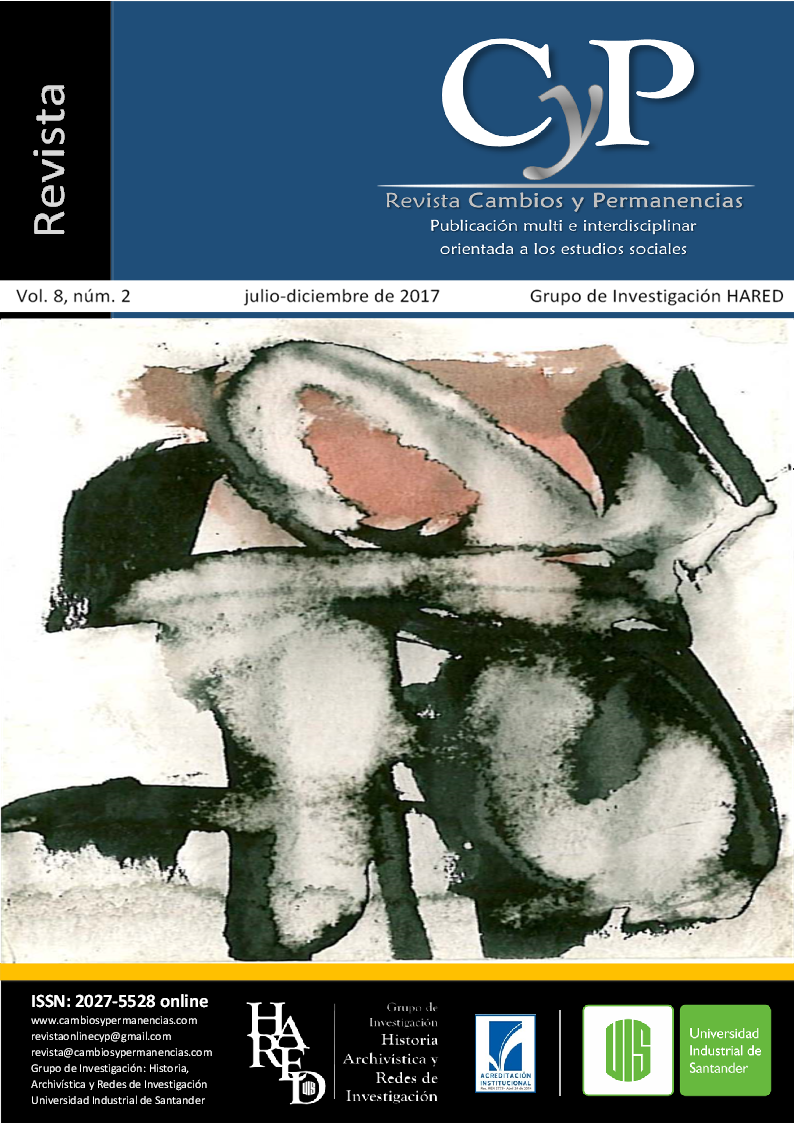Dossier Interdisciplinarité en sciences sociales: l'exemple des études de mémoir
Memory without borders. From the Guadalajara Case to the Argentinian Querelle : 2008-2017, Spain
Published 2017-12-15
Keywords
- historical memory,
- Spain,
- internationalization,
- Guadalajara Case,
- Querella Argentina
How to Cite
Benchili, I. (2017). Memory without borders. From the Guadalajara Case to the Argentinian Querelle : 2008-2017, Spain. Cambios Y Permanencias, 8(2), 769–784. Retrieved from https://revistas.uis.edu.co/index.php/revistacyp/article/view/7812
Abstract
Since 2002, NGOs in Spain fought crimes of Franco Regime to recover truth, justice and reparation. Even if they succeeded in collecting a large range of testimonies, the Spanish State is not responding to their desire to go further. The Association for the Recovery of Historical Memory, in 2008 started to turn to the international sphere, the Argentinian justice under the principal of universal justice. This article aims to define what is the Guadalajara Case and in a larger scale the Argentinian Querelle, which will provide a new way of thinking truth, justice and reparation.
Downloads
Download data is not yet available.
References
Castro, A. G., y Ruiz-Rivas, T. (2008). La terre sous les pieds. Entretien sur l’installation « Fosse commune » et la question des disparus de la guerre civile espagnole. Cultures & conflits, (71), 153‑166, doi: https://doi.org/10.4000/conflits.16763
Chinchón Álvarez, J. (2007). Derecho internacional y transiciones a la democracia y la paz: hacia un modelo para el castigo de los crímenes pasados a través de la experiencia iberoamericana. Madrid: Ediciones Parthenon.
Escudero Alday, R., y Pérez González, C. (Éd.). (2013). Desapariciones forzadas, represión política y crímenes del franquismo. Madrid: Editorial Trotta.
Feld, C. (2006). Quand la télévision argentine convoque les disparus: Modalités et enjeux de la représentation médiatique d’une expérience extrême. Le Temps des médias, 6(1), 188, doi: https://doi.org/10.3917/tdm.006.0188
Ferrándiz, F. (2014). El pasado bajo tierra: exhumaciones contemporáneas de la Guerra Civil (Primera edición). Barcelona: Anthropos.
Freyss, J. (2004). La solidarité internationale, une profession ? Ambivalence et ambiguïtés de la professionnalisation. Tiers-Monde, 45(180), 735‑772, doi: https://doi.org/10.3406/tiers.2004.5527
Jelin, E. (2006). Les mouvements sociaux et le pouvoir judiciaire dans la lutte contre l’impunité. Mouvements, 47‑48(5), 82, doi: https://doi.org/10.3917/mouv.047.0082
Lefranc, S., & Mathieu, L. (Éd.). (2009). Mobilisations de victimes. Presses universitaires de Rennes, doi: https://doi.org/10.4000/books.pur.10671
Messuti, A. (2013). Un deber ineludible: la obligación del estado de perseguir penalmente los crímenes internacionales. Buenos Aires: Ediar.
Ocaña Garcia, M. (1996). El hombre y sus derechos en Francisco de Vitoria. Madrid: Ediciones Pedagógicas.
Roht-Arriaza, N. (Éd.). (1995). Impunity and human rights in international law and practice. New York: Oxford University Press.
Chinchón Álvarez, J. (2007). Derecho internacional y transiciones a la democracia y la paz: hacia un modelo para el castigo de los crímenes pasados a través de la experiencia iberoamericana. Madrid: Ediciones Parthenon.
Escudero Alday, R., y Pérez González, C. (Éd.). (2013). Desapariciones forzadas, represión política y crímenes del franquismo. Madrid: Editorial Trotta.
Feld, C. (2006). Quand la télévision argentine convoque les disparus: Modalités et enjeux de la représentation médiatique d’une expérience extrême. Le Temps des médias, 6(1), 188, doi: https://doi.org/10.3917/tdm.006.0188
Ferrándiz, F. (2014). El pasado bajo tierra: exhumaciones contemporáneas de la Guerra Civil (Primera edición). Barcelona: Anthropos.
Freyss, J. (2004). La solidarité internationale, une profession ? Ambivalence et ambiguïtés de la professionnalisation. Tiers-Monde, 45(180), 735‑772, doi: https://doi.org/10.3406/tiers.2004.5527
Jelin, E. (2006). Les mouvements sociaux et le pouvoir judiciaire dans la lutte contre l’impunité. Mouvements, 47‑48(5), 82, doi: https://doi.org/10.3917/mouv.047.0082
Lefranc, S., & Mathieu, L. (Éd.). (2009). Mobilisations de victimes. Presses universitaires de Rennes, doi: https://doi.org/10.4000/books.pur.10671
Messuti, A. (2013). Un deber ineludible: la obligación del estado de perseguir penalmente los crímenes internacionales. Buenos Aires: Ediar.
Ocaña Garcia, M. (1996). El hombre y sus derechos en Francisco de Vitoria. Madrid: Ediciones Pedagógicas.
Roht-Arriaza, N. (Éd.). (1995). Impunity and human rights in international law and practice. New York: Oxford University Press.

